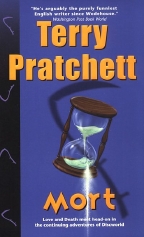Mort
Terry Pratchett
Harper Collins
US Mass Market Paperback
ISBN 0-061-02068-0
Publication Date: 02-01-2001
243 Pages; $6.99
Date Reviewed: 10-13-03
Reviewed by: Rick Kleffel © 2003

REFERENCES
COLUMNS
|
|
|
MortTerry PratchettHarper CollinsUS Mass Market PaperbackISBN 0-061-02068-0Publication Date: 02-01-2001243 Pages; $6.99Date Reviewed: 10-13-03Reviewed by: Rick Kleffel © 2003 |
|
|
REFERENCES |
COLUMNS |
'Mort' is the fourth novel in Terry Pratchett's Discworld series and the first devoted exclusively to Death. It's a tight, funny little fantasy about Death. If this sounds like a contradiction in terms, then you've not read Pratchett yet, or even heard about him. As one who prefers to read series in chronological order, as written, if you haven't read any Discworld novels yet, then 'The Color of Magic' is the best place to start. That said, 'Mort' is also an excellent introduction to one of the most beloved characters in Discworld, Death. Pratchett does more in 'Mort' than have fun with a familiar anthropomorphic personification. He satirizes love stories while writing a perfectly enjoyable love story. He satirizes employment while writing of a mid-life (or death) career change, lets roll one gorgeous description after another and serves up jokes with an unparalleled ease. He effortlessly re-invents fantasy while subverting the genre.
As 'Mort' starts, the titular teenager, whose picture is in the dictionary next to both "gangly" and "geek", has been dragged to the local job fair by his father to be shopped off as someone else's assistant. Mort and his father wait until the final stoke of midnight, when a tall and very thin gentlemen -- just bones, no skin -- shows up with the offer of a lifetime: an opportunity to be Death's apprentice. Mort gets the job, but the opportunities for love are more interesting than the chances to deal death.
'Mort' extends and finesses the borders and details of Discworld while providing a very straightforward plot that will keep the pages turning relentlessly. Pratchett really lays on the lush language in his wide-angle descriptions of life in Discworld, but focuses most importantly on a limited cast of characters, bringing the reader even into the heart of Death himself. Pratchett manages to do all this without even really having a specific antagonist beyond the circumstances created by the characters as they make one ill-informed choice after another. As Mort learns the trade, he grows in ways both good and ill. Death experiences his own version of humanity, while his adopted daughter, Ysabel and Death's chief cook and bottle washer, Albert, find their way towards a destiny inside, not outside of time.
'Mort' finds Pratchett stepping away from the strictly heroic fantasy-specific satire and towards something equally enjoyable but a bit more universal and even literary. He succeeds by virtue of making the reader care about and enjoy each character, no matter how small or incidental they might at first seem to be. Once he's invoked sympathy for the characters, the humor is funnier, the emotions more poignant, the tension more stressful and the resolution more satisfying. Mort's growth out of gangly-hood is both rewarding and frightening. If you've ever watched a teenager grow up, you'll recognize the symptoms. But even more enjoyably, Pratchett puts Death through some changes as well. Having created Death as an Anthropomorphic Personification, Pratchett succeeds at turning him into a character with whom the reader can sympathize, no small feat when speaking of the Grim Reaper.
'Mort' benefits as well from a tension inducing plotline that keeps the pages whizzing by as the reader strives to find out how Pratchett can resolve the crumbling situations he's set in motion at the beginning of the novel. That Pratchett can do so in a manner satisfying to readers is something of surprise; that he can do so in a manner satisfying to the characters is something of a triumph. 'Mort' thoroughly succeeds at the seemingly impossible task of bringing Death to life, while bringing life to Pratchett's own unique intersection of fantasy and literature.